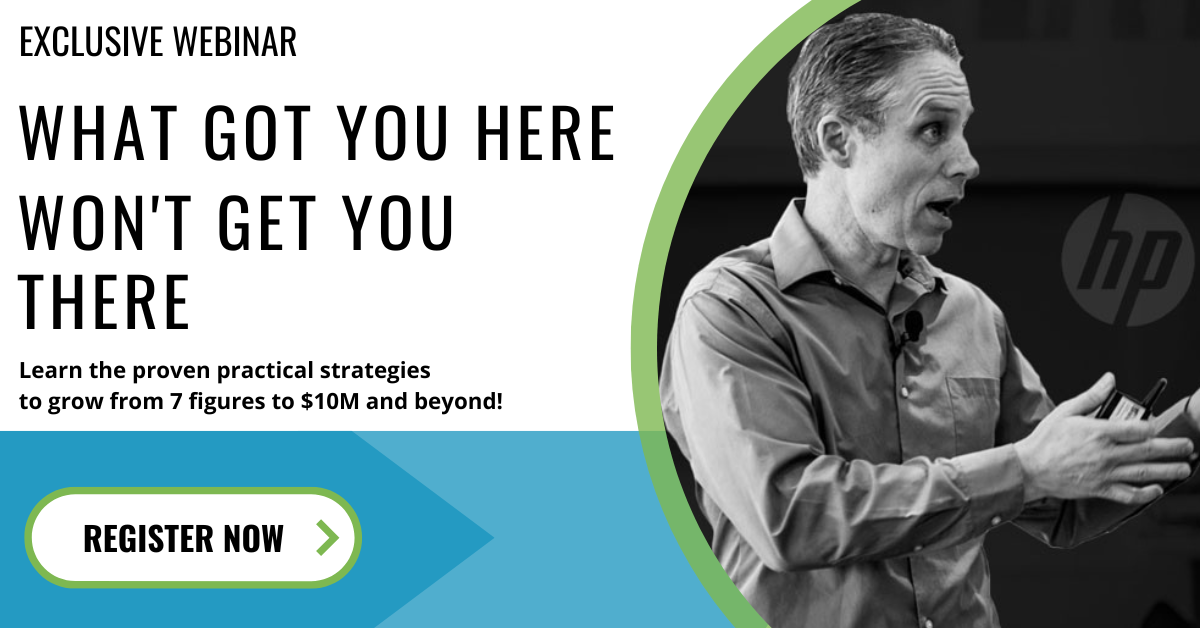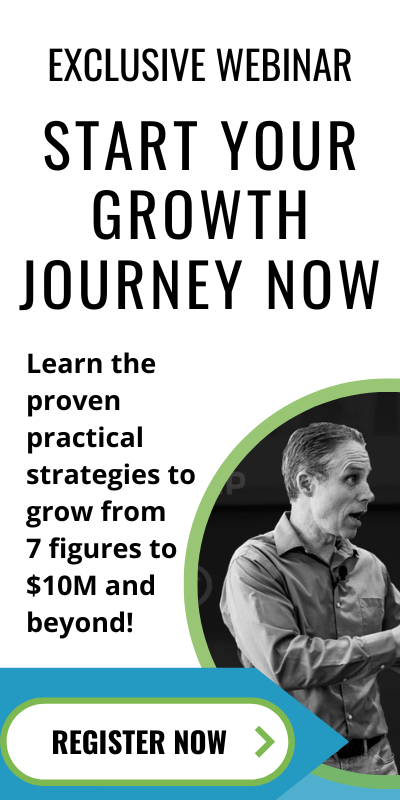Episode 158: What It’s Like To Be The Right-Hand Person To An Entrepreneur With Miranda Daigneault
What the podcast will teach you:
- What it’s like to be the right-hand person
- The challenging part around working with a visionary leader
- The importance of the right-hand person in your business
- What a business owner could do to decrease the right-hand person’s anxiety
Resources:
- Reach out to Miranda Daigneault
- Facebook: https://www.facebook.com/miranda.helfrich
- LinkedIn: https://www.linkedin.com/in/mirandadaigneault
—
Watch the episode here
Listen to the podcast here
What It’s Like To Be The Right-Hand Person To An Entrepreneur With Miranda Daigneault
I’m excited about this episode because we’re doing something a little different. Typically, I have a guest who is more than likely a business owner of a 7 or 8-figure business. Well into 7 figures, they’re thinking back on their journey from $1 million to $3 million and what that was like and sharing lessons learned. Once in a while, I’ll take an episode to do what I call a solo cast. I’m sharing a concept that would be useful to all of you based on working with hundreds of business owners like you.
This episode is a little different. It’s the first time we’ve ever done this. I’m bringing a team member to be with me. It’s not a solo cast. Maybe we’ll call it a dynamic duo cast or something. Let me introduce her and then I’ll tell you a little bit about what this episode is going to be. Welcome, Miranda Daigneault to the show. I’m glad you’re here.
I’m excited to get to be a part of this episode. It’s going to be a lot of fun.
Miranda has been part of our elite entrepreneur’s team for a couple of years now. She’s great to have. She’s an amazing team player. She’s one of our elite business coaches. She leads our marketing efforts. She’s one of those solid people to have around. We’re grateful that she’s here. Miranda, you know this, but let me say it to you as a way to set it up for everyone else. In this episode, you’re going to represent a role that you’ve had before, and that is the key role of that right-hand person, operations leader, office manager, or that key person. Fill in the blank of your favorite job title.
Many business owners have created a hub-and-spoke model at first where they’re the hub and they make it all go. They start hiring a team. They have people they can start to give tasks to. Eventually, they recognize, “I’m stuck in my own creation. Until or unless I get out, this can’t grow any further.” They have this genius idea. “I’m way better as a visionary. I don’t want to be stuck in all the details. I need a strong operationally minded person, an operations leader, or a right-hand person to come in and take all the stuff off my plate so that I can be this creative genius and build the business, do strategic partnerships, and maybe product work or high-level fulfillment of our product, service, or whatever.”
We hire a Miranda. We say, “Miranda, come save my world. Come make it so much easier.” Now that I’ve set that up, why don’t you tell us a little bit? This isn’t your role at Elite Entrepreneurs, but you have played that role before and it is what makes you a super valuable coach for us in our business. You’ve been right there on the front lines in the trenches with the seven-figure business owner, seeing, feeling, and experiencing it all. Why don’t you tell us a little bit about that business and that role, and then we’ll get into unpacking what is going to be super valuable for folks.
I was the right-hand person or whatever you might call it, director of operations as we called it at the time, for a naturopathic physician. I started at that job at the front desk. I won’t give you the whole history but I was there for a while. I showed up and kept doing a good job. One day the manager there decided to leave. She and the owner of the practice said, “We think Miranda can do it. We’re going to let her take a crack at this thing,” which is often what happens. I’m including that detail because it’s often what happens in the businesses that we work with at Elite. The person who is head of operations may or may not have any experience in doing that thing, running a business, leading a team, or whatever when they get put in that spot.
That’s what happened to me. I led that practice, the entire team, and everybody there. I did that for a few years. While I was doing that, we grew an online business from scratch. We had the clinic and everybody was there. That was a thriving practice. It was a seven-figure business and then we grew an online business at the same time. We had a small newsletter list. They ended up being separate businesses. At first, they were together and then we broke them apart. By the time I left there, they both were seven-figure businesses. There were quite a lot of steps along that path. Generally speaking, that was my role at that place.
The owner is a physician or a doctor. There was a manager and then that person was leaving, and they said, “Miranda has the skills and ability. Matt, train her. Give her experience or whatever.” They picked you for the role, and then eventually, that led to you being the right hand and helping to build this other business. You’re the director of operations for these two seven-figure businesses. That’s quite an impressive feat to be able to manage that. Talk to us about what it was like to work with that business owner. First, when a business owner decides, “I need some help with somebody to run the operations,” what was the version of that like for you? How did he view his role compared to your role? How would he characterize that?
He would think of himself as the visionary and me as the implementer. We had that conversation. We talked about rocket fuel at the time. It’s the conversation of he was the visionary and I was the implementer. We had a harmonious relationship in each of those roles with each other at the time. He was and still is a visionary. He’s a brilliant man and is always thinking ahead and creating. He’s a smart man and likes to create things. He likes the idea of building new things or shooting for the moon. That was one of our core values there. I helped the team create core values while I was there, but that was one of them.
It was always like big dreams, goals, and aspirations. We would hit them over and over again like high achievers. He didn’t have time and didn’t want to spend time in the minutiae of the details of everything else. He was great at vision setting, even though I didn’t understand vision setting the way I do now with my experience at Elite. He was great at vision setting and continuing to put that vision in front of us. He did that effortlessly and maybe after we had worked together, he was doing that intentionally. At first, it came naturally to him.
Hit your big dreams, goals, and aspirations over again like a high-achiever. Share on X
He was great at that. My job in all of it was to make sure everybody else was on the same page. He trusted me to figure out how to get stuff done, even if I had no experience, which I didn’t. He had all the faith in the world that whatever project, thing, or whatever he put in front of me, I would figure out. That’s how he saw me and what he leaned on me to do while I was there. He had big goals and aspirations. He was like, “I want to do this.” Sometimes he would be like, “Here’s how I’m thinking we go about it.” Sometimes he would be like, “Go figure it out. I’m going to circle back and ask you how that’s coming.” That was the way that it came together.
That’s helpful. Before you stepped into that role, there was somebody prior to you who was in there. You weren’t there for this time that I’m about to describe, but imagine the time when there wasn’t an implementer, a manager, or a director of operations there and the doctor needed to handle all of those details because you came to work closely with him and knew him pretty well. How might that have looked without the person there?
I have a little bit of an idea. I knew him well and worked closely with him for a long time. He used to be a one-man show. Even as a physician, he had a little office and would talk back in the day when he had the little office. He would do all the things. He would see people, schedule them, follow up, and do the IVs, like all of it. He was in every step of the process and then he slowly added a little bit of help. He had somebody that would come in sometimes. They would do whatever the next piece of the puzzle and then he would add the next person and the next, and then it got to a place where they were at the practice that we were.
I’m sure it was like the owner or the physician. Whoever the second person was, that person pretty much had to level up to the office manager. That person had to grow along. There was someone before the person before me who had to grow along in that role and then he could place in the other things. It’s like the front desk/everything else. That person grew to be operations and then they filled in the rest of the team.
In this case, being a physician, his highest value is seeing and treating patients. Every minute he had to schedule, follow up, bill, code, or whatever the other activities were was time away from the thing that drove the most value in that business. He didn’t want to spend time on the lower-cost activities, the lower-value driving activities. He built up a team and then he realized, “Now I’m spending too much of my time coordinating all this stuff, I need somebody who can come in and do that.”
You end up in that spot eventually. If you could go back in your memory a little bit, if anything, what was frustrating about you working with a visionary business owner who was going presumably shiny object or multiple directions or had big plans? What was difficult for this right-hand person or this director of operations role that you were in? What was challenging about working with a stereotypical visionary leader?
Like so many people, one of the most amazing things about them also sometimes can be one of the most challenging things about them. We are all guilty of that. He would probably laugh at me saying that, but he was such a beautiful visionary still is to this day. What can be challenging about that is the pace of trying to keep up with it was difficult. There were numerous projects that we would start and then we wouldn’t complete. We would start every project with so much excitement and enthusiasm. It was like, “This is going to be the thing. This is going to be amazing. Here’s how we’re going to go after it. Here’s what we’re going to go do.” You can imagine how busy I was like just leading the practice.
I don’t want to imagine. Let’s hear about it.
It is a full-time job. Depending on the time, there were anywhere from ten-ish team members there, including other physicians. There was a lab, front desk people, and medical assistants. That operation alone was many moving parts and lots of little divisions more than you would for a smaller team. There are a lot of details to track. It is sensitive information, these patients’ stuff. I had to know about OSHA, safety things, and billing. We didn’t contract with insurance, but there are many details and things to manage.
It was like, “We’re going to start this newsletter thing. We’re going to start sending emails to people.” “That sounds cool. We’re going to do that.” Sending the newsletter happened a little bit before I became the manager of everything. It was like, “Now we’re going to intentionally go after building this list. We’re going to do that thing.” We checked those boxes, moved forward, and progressed towards our goals with the online business, but you can imagine how there were lots of different ideas of ways that we could grow that thing, and not all of them worked.
He was new to the online business space. We had different ideas of things that we could do to sell, grow, create a course, or create a challenge. We would put in a lot of energy and effort to make these things happen and make them happen quickly. There were many times that we would do that and before it was even complete, we would be on to the next project. Although there were lots of rewarding moments in making things happen that I didn’t even know I could be a part of, there were also many moments where it was exhausting to start a big project and feel the weight of the responsibility of making that thing happen.
That’s specific to the right-hand person, the feeling of pressure. If you have a great right-hand person, they feel the weight of your business way more than you think they do. If you have somebody in that spot who cares, hustles, and wants to do a good job, they feel the pressure of the success of any project or anything that you hand over to them. When you have somebody who feels that way about your business and that you trust them to go charge after things, then you pivot or they don’t even quite get to complete the project, it’s exhausting.

Right Hand Person: A great right-hand person feels the weight of your business way more than you think they do.
It feels like the hamster in the wheel thing where it’s like, “I’m never going to catch up to the end of it.” At Elite, we talk about quarterly goals. We’ll use that simple term. I meet with you every quarter and we look back on how I did the quarter before. We didn’t have a system like that in place. it’s not because the owner didn’t care and didn’t want me to feel good about what I did. We just didn’t have that system in place. To me, it felt like working tirelessly and never being acknowledged. That’s probably too general. He acknowledged me in my work sometimes, but we didn’t have that rhythm or consistency of stopping and looking back at what we got done. It was always like, “Go for more.”
You’re painting the picture clearly. If I were a visionary leader, what would you like me to understand about how fun or exciting it is to work with a visionary leader? Let’s start there. I’ve seen it in your face. I’ve heard it in your voice. Some energy comes in when you talk about how smart he was and how visionary. it was great in all these ways. I’d like for you to tell visionary leaders the plus or the pro side of working closely with somebody like that.
I’m glad you asked that question because I wouldn’t want the message that I’m sharing from this perspective to be like, “Don’t go chase your dreams. Tone down your visionariness.” I would never want that to be the message because there were beautiful things about it. Not everybody is a visionary. When you aren’t that kind of person, it’s exciting or rewarding to be tied to a cause with someone who is a visionary. You get to have that feeling of having somebody encouraging or pulling out of you that dream bigger idea. When that doesn’t come naturally to you, which it doesn’t come naturally to everyone, and quite often when you work for someone else, the entrepreneurs have that visionary thing.

Right Hand Person: It’s exciting or rewarding to be with someone who is a visionary. You have somebody encouraging or pulling out of you to dream bigger.
When you’re a team member, you don’t always have that visionary thing to work closely with someone who wants to shoot for the moon, dream bigger, and achieve more. It’s exciting to come along for that ride. It’s a beautiful thing. That is one part of it that I would call out. The other thing that I would call out that I imagine is a similar experience for other right-hand people, maybe not all, but I imagine it’s there is his faith in me. His belief in me was pivotal for my growth and development as a person. I wouldn’t be here now doing what I do if he hadn’t seen potential in me and believed in me to make stuff happen.
The way that he would share ideas, projects, or whatever it is that we were working on, he would share them with me and there was no question in his mind if I could figure it out. He had zero doubt. He knew that I had no idea what I was doing. At the end of the day, he still was like, “You’re going to go do this. This is going to be great. It’s going to be awesome. Isn’t it going to be cool when we go do this thing together, like this idea and we make it happen? Isn’t that going to be amazing?” That faith pulled something out of me that wouldn’t be there if I hadn’t spent that time with him. It’s truly a pivotal moment in my life.
I don’t know that every visionary business owner gets to fully appreciate what you just expressed. I hope that we’re giving a little bit of a gift there to them that their ability to see bigger possibilities and allow others to have the thrill of that ride and be part of that ride is amazing. On top of that, what you expressed very meaningfully, thank you for doing so, is that same belief about what is possible in the future sounds like he was able to use that same belief to unlock some abilities in you and bring out something in you that maybe you weren’t even aware that you could do. He just believed that you could do it. That led to a lot of growth.
Think about conversations I’ve had with seven-figure business owners about their team, they invest much in their team and want to do right by them and want them to do well. It feels deeply personal sometimes when a team member leaves, especially one that you care about. I would encourage them to consider that perspective. Even if a team member is with you only for so much time and then moves on to whatever the next thing is, remember how huge it is to make that difference for someone.
Wherever that team member goes or whatever they are a part of next, they’re going to be better off because of the time that they spent with you. It taps into that exponential difference that you can make in the world. That’s not even talking about what your business does, the fulfillment of the product, or the thing that you do. That’s because of the time that your team members get to spend with you.
Wherever that team member goes and whatever they are a part of next, they will be better off because of the time they spent with you. It taps into the exponential difference you make in the world. Share on X
Let’s switch over to the other side of the paper. I have pros on one side and cons on the other. They’re not cons. Let’s call them reality. The reality is there are some awesome things about working closely with the visionary. There might be what I’ll call some wake or some unintended consequences of that big push, big energy, or big dreaming. Moving from one opportunity to another could affect others in the team, especially this right-hand person or this key role in their business.
We’re not here to bash your former amazing visionary leader. We’re here to paint a picture so that other visionary leaders can understand what it might be like in that right-hand position. You use the term exhaustion earlier and do not always finish things that we start, which might have some demoralizing effects on a team member. You mentioned not knowing if you were doing the thing and not stopping long enough to look back and see progress or accomplishment or whatever. I don’t want to be putting words in your mouth, but those were some of the things I heard you saying. Do you want to add to what I said or take this in a different direction?
I’ve shared this with you once before, but it’s been a while. One of the things that we teach at Elite is the big three and I don’t need to go into the details of that right now. Essentially, it’s getting clear about what success looks like for each role. It’s what objectives each team member should hit, in the simplest form. One thing that business owners forget about or maybe have never experienced, there are many business owners that I work with who have never worked for somebody else. They’ve always done their own thing. They can’t even tap into what it might feel like to work for someone else because they’ve never been there.
For others, you’re either in that box or most, by the time they get to work with us, are so far away from that game that they have forgotten what it feels like to work for someone else. The truth of the matter is that when you work for someone else, in a small way, you are putting your fate in their hands. I get it. We’re all independent people. I’m in charge of my life. I get to decide what I do today if I stick around or whatever. I understand that I have that choice and still, when you work for someone else, it feels a bit like your fate is in their hands for a while, whatever amount of time that you’re there.
On any given day, I could wake up tomorrow or we could end this show, and you could be like, “That was terrible. You have to go.” I know you’re like, “Miranda, don’t even joke about that,” but still that possibility exists. This job could go away for me at any given moment. Business owners forget or don’t know what that feels like. To tie it back, I started by talking about the big three. I fight the good fight for that tool. The reason I do that is because it enables team owners to have as much ownership as possible in their job security.
It helps them understand that what they’re doing is keeping them safe. When you think about the way that even high-level style, the way that I talked about my role at that doctor’s office and the things that I kept track of and managed for him and all of the things that I helped him build or start to build and not, you would assume like, “She was golden there. She had nothing to worry about. She wasn’t going anywhere.”
The Big Three enables team owners to have as much ownership as possible in their job security. It helps them understand that what they're doing is keeping them safe. Share on X
I imagine most people who interacted with us at the time also felt the same way. I always had a bubbling anxiety underneath the surface that at some point I was going to drop the ball on something major and it was going to be the end of my role there all of a sudden. He would probably feel terrible if he heard that I felt that way. He would never have wanted me to feel that way. That is the truth of what it feels like to work for someone else.
Even when you show up and you’re doing a good job and you’re working hard, it’s up to someone else if you get to come back tomorrow. I would encourage business owners to consider how they talk to their team members about how they’re doing, how clear they are on what success looks like, and how often they check in on if someone is doing what they should or should not be doing because that anxiety can be crushing, especially when you’re talking about the right-hand person. It feels like the most pressure for your team members in that spot.
A lot of pressure and little to no ownership in the actual equity of the business, but you’re close to that leader or owner that a lot of the pressure that he or she carries, you feel some of that by association and you feel a lot of it by delegation like, “Here. Take it.” You’re feeling a lot of the pressure. You used the word anxiety a couple of times and this is a little game-time decision or on the fly here. If you had a piece of advice for a business owner who has this key right-hand person that they lean on and rely on, what could that business owner do that would decrease the anxiety?
I would say a couple of things as we teach it at Elite, make sure they have the big three, but for anybody else who is tuning in, be clear on what success looks like for this team member for the next amount of time. We talked about a quarter or the next three months. Don’t go further than that because you know how many different projects could you possibly start and finish in a quarter. Even that number, it’s more than you think. For the next three months, what does success look like for this person? What goals do you want them to hit? What projects do you want them to complete? If you’re talking about leading the team, get real clear on what they need to be doing in terms of their leadership that they can be improving on and working on.
Consistently, talk to that team member about how that’s coming along. Set clear goals and objectives with the team members. If it’s your right-hand person, they should know as easily as you should what those things should be. Let them co-create with you what their main objectives should be and then continue to check in with them on how they’re coming along. It’s consistent weekly one-on-ones, clear goals, and objectives that are co-created. I have to add the details of these goals and objectives like, “If you have twenty, it’s too many.”
There’s no way that they could succeed. Give them some focus and some way to know that they’ve won. If you give them 10 goals and objectives and they’re able to move or complete 2 and then the other 8, they move forward a little bit, that’s not going to feel like a win. They’re going to get to the end of the quarter and they’re going to feel like, “I left all these things hanging.” It’s about calling your shot that way. The other thing that seems overly simple but is a good reminder is you cannot thank your team members enough. You cannot show appreciation too much. It’s not possible. You’re never going to overrun it.

Right Hand Person: It’s a good reminder that you cannot thank your team members enough. You cannot show appreciation too much. It’s just not possible.
Have I told you that I appreciate you? I’m trying to do it in real time here.
You can’t overdo it. I remember when I was there and I was new to leadership, but social intelligence came naturally to me. I was new to leading and when everybody would leave every day, I would thank them. I started doing that because I am who I am. There was no intentionality around it. I started, “Thank you so much for everything you did. Thanks so much for all your help today.” I said it to everyone every day every time they left. I started doing it.
One of our team members was a buddy of mine. One day I looked at him and I was like, “Can you give it to me straight? Is it too much? When I say thank you every time, is it like, ‘Whatever, you say that every day?’ Have I overdone it and now it doesn’t mean anything?” He was like, “Don’t be ridiculous. I love hearing it every single day.” I was like, “Thanks for that.” It’s the smallest gesture. I’m not saying you have to thank every team member at the end of everything every day. It’s just a good story or a good example to share in terms of showing them consistently that you care and that you’re grateful for what they’re doing.
It’s a very practical “been there, done that” type of idea. Most of what you shared would fall into the category of things that maybe a visionary leader might not be doing now that they should consider beginning, like role clarity, connecting every week, and letting people know how they’re doing and thanking them. That was in the category of they’re usually not doing this and it would help if they did. Let’s go to the other side of that. On the anxiety question still. Things that they do that increase the anxiety that if they wouldn’t do would make things a lot easier.
The first thing that comes to mind for me is setting unrealistic expectations. What’s funny is the word unrealistic probably isn’t the right choice because for visionaries, everything’s realistic, “We can do that in two weeks. What are you talking about? That’s possible. What do you mean that’s not possible?” Unrealistic probably wasn’t the right word. I don’t mean to say that you have to give everybody all the time in the world for every project that you think of, but I guess it would come back to the co-creation process.
“If we’re all going to go chase after this thing together, or even you and I are going to go chase after this next thing together, how quickly do you think we could do it? What resources do you need to be successful?” Starting the conversation or having a practice of having those conversations that way versus, “I want you to go do this thing and you got to get it done by this time.” That place, from my experience and my perspective, I was like, “How am I going to figure that out, but he believes in me.”
It’s like, “Did he forget all the other things he’s asked me to do? Did he forget the day-to-day machine that I still make sure runs, but he also gave me this project and now he’s asking me this? Did he forget all this over here?”
“Help me prioritize.” Even that is fine. If it feels like too much of a stretch to cross things off the list, which I know sometimes it feels like that as a seven-figure business owner, get clear about prioritizing. Which things are most important? Above all else, “If we got this done in this amount of time, we can feel like we succeeded.” That conversation.
All of these have been extremely useful insights, at least in my opinion. Our visionary business owners out there will appreciate hearing from their right-hand person, and that’s who you represent in this episode. It might not be a perfect fit with what those right-hand people are feeling or experiencing, but you’ve opened up some eyes and ears to the idea that some of their amazingness might have some unintended consequence. It might be creating some havoc for that person that they rely on so much. As we wrap this time up together, you may have shared this with me before, and I genuinely don’t remember, but why aren’t you still in that spot? Why did you decide, “I’m not doing this anymore, I’m going to do something else?”
I ended up leaving that job. I moved. When I moved, he still wanted me to be a big part of the business. I couldn’t lead the clinic anymore, but I was still leading the online space. That’s when I moved from Arizona back to North Dakota. At that time, I decided, I didn’t have a lot of friends that I knew in North Dakota and I wanted to connect with that community. I felt like a woman on an island leading a team and not getting out there and meeting anyone. That’s why I ended up leaving to get more rooted in North Dakota when we moved back. He would’ve kept me around for a lot longer if I had wanted to stay.
I’m sure he would’ve been stupid not to. My point in saying that is thank you. Don’t forget how much we appreciate having you on our team, but I wonder secretly, on behalf of all the visionary leaders out there with right-hand people, how much would it take to push your super valuable teammate a little too far? How much would it take for them to experience burnout and say, “I love you, but I can’t do this anymore. It’s unrealistic. It’s too crazy. My health and relationships aren’t well. I’m giving too much to this?” Sometimes visionary and high-power and high-energy types of business owners can burn some people out on the way, and this is a person that they want to make sure is doing well.
If I can add something to that, if you are a visionary and a business owner, and even if you don’t have any concerns about your right-hand person right now, the odds are good. They’re feeling some element of something that we talked about. For me, the simplest or easiest action step to take in terms of making sure that your right-hand person doesn’t leave because it’s all too much or for whatever other reason might happen is to communicate with them and talk to them about it.
Maybe this episode can be a way to open up that conversation. If you don’t know how your right hand is feeling, or if they’re close to overwhelmed and leaving, if you’re like, “I don’t know. I feel like she’s doing pretty good,” or maybe, “She might be on the edge of that.” Either way, maybe you could share this with them and then have a conversation like, “Did any of that ring true? Let’s talk about it.”

Right Hand Person: If you don’t know how your right-hand person feels or if they’re close to overwhelmed, have a conversation with them.
What’s your version of the good things that come with working with crazy me and what’s your version of the things that are a little challenging working with wonderful me? That’s been super amazing. I hope that a ton of business owners get the value out of this that I believe you’ve helped to create by sharing your story. Thank you for what you do in the Elite Entrepreneurs team. Thank you for sharing with our show. Is there any other thing that you want to leave as a parting thought as we wrap this up?
I hope business owners, after tuning in to this, don’t leave feeling like there’s something bad about the visionary being the visionary, or if you have team members you’re concerned about, I also don’t want you leaving with anxiety. All of this is solvable and okay. It’s just having that next level of awareness, talking to your team, and checking in with them. Don’t let it be scary. Let it be a great beautiful thing that starts the next level of your teammates feeling great about being there.
Don't let it be scary. Let it be a great and beautiful thing that starts the next level of your teammates feeling great about being there. Share on X
Thank you. For our audience, please like, share, and review. We want to make sure that this episode and all of our episodes reach as many seven-figure business owners as possible. There is a way to grow without going crazy. There are ways to find joy again in your business. There are ways to level up as a leader and to grow this thing and the impact that you can have in the world and on the people involved in that touch your business. Keep it up and we will see you next time.
Important Links
About Miranda Daigneault
 Miranda Daigneault is a Business Coach for Elite Entrepreneurs, a company that helps $1M+ businesses scale to $10M and beyond. Miranda spent much of her early career as the right hand to small business owners. She knows all too well what things hold them back and how amazing it can be then they step into being the leaders their businesses need. She’s an experienced coach with a passion for leadership and helping people achieve their dreams.
Miranda Daigneault is a Business Coach for Elite Entrepreneurs, a company that helps $1M+ businesses scale to $10M and beyond. Miranda spent much of her early career as the right hand to small business owners. She knows all too well what things hold them back and how amazing it can be then they step into being the leaders their businesses need. She’s an experienced coach with a passion for leadership and helping people achieve their dreams.
Want to listen to more? View all episodes here >



